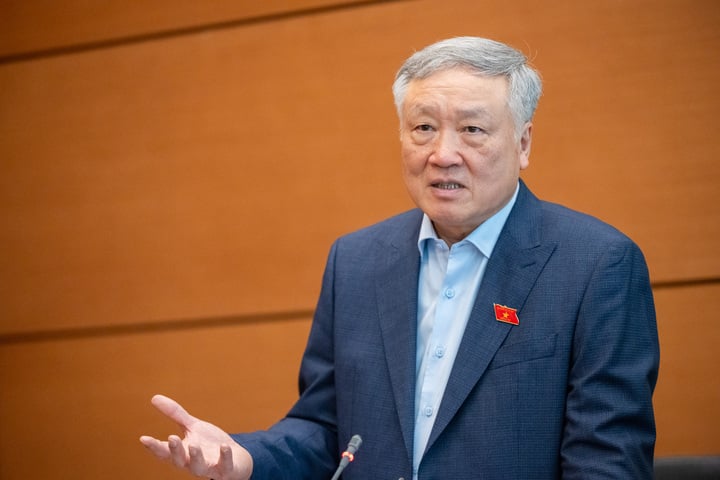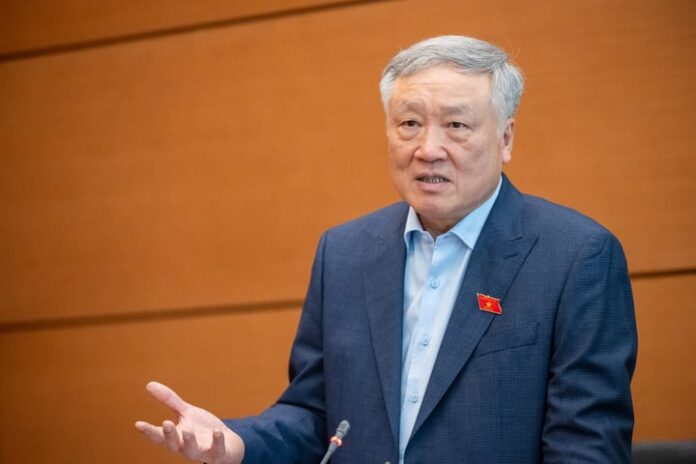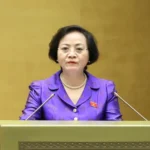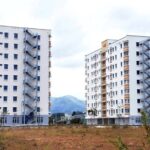Deputy Prime Minister Nguyen Hoa Binh shared the above information during a group discussion on June 11th, 2025, regarding the rearrangement of administrative units at the provincial level for the upcoming year.

Deputy Prime Minister Nguyen Hoa Binh. (Photo: quochoi.vn)
According to the Deputy Prime Minister, after the merger, it is not necessary to immediately transfer all officials from the old province to the new one. Instead, a portion of the officials can remain to guide the local government in resolving issues that may arise during the initial transition period, such as smoothing out the operations of the communal government, dealing with pending projects, and understanding the local population.
Deputy Prime Minister Binh emphasized the need for a roadmap to ensure a smooth transition and the effective functioning of the new administrative machinery.
Addressing the concerns of officials, he acknowledged that it is impossible to have a policy that immediately satisfies 100% of the needs, and there will always be those who agree and those who do not.
“In the case of two Standing Committee members who are also heads of the Organization Commission, for example, one must step down as deputy for the other to continue as head. We cannot have two heads of the Organization Commission, two heads of the Inspection Commission, or two directors of a department. Such situations will inevitably affect the morale of the officials. However, the spirit of sacrifice and putting the common good first must prevail. If we want everyone to be happy, we would have to make both of them directors, which is not practical,” added the Deputy Prime Minister.
Regarding the effectiveness of the National Assembly’s resolution on the rearrangement of administrative units at the provincial level, Deputy Prime Minister Binh noted that while the National Assembly wishes for the resolution to take effect immediately upon passage, it may not be feasible to expect the new machinery to function immediately.
“Following the direction of the Politburo and the Government, on June 30th, all provinces will simultaneously announce their new administrative boundaries, along with the new leadership of both the Party and the government. On the morning of June 30th, all localities will announce the positions at the provincial and communal levels, and on July 1st, the new machinery of the two levels of government will begin operating,” said the Deputy Prime Minister, expressing his support for the resolution to take effect on July 1st, as proposed by the Government.
On the matter of handling public offices, Mr. Nguyen Hoa Binh shared that the Government has instructed a comprehensive review of all commune, district, and provincial offices and that the provinces will propose utilization plans based on the following priorities: education (schools and kindergartens), healthcare (health stations and hospitals), cultural and welfare facilities (community centers), and public service centers. Other options will be considered afterward.
“This issue involves many aspects, so we must create a legal framework to address it. For example, converting a military headquarters or a police station into a kindergarten is a change of purpose, and we need a legal framework to facilitate such transitions,” said the Deputy Prime Minister.
Regarding policies for officials, the Deputy Prime Minister praised the current policies as very good. However, he emphasized that policy implementation must be accompanied by agitation and ideological work to ensure that officials who retire are happy and willing to make way for younger generations. He noted that “it’s not just about giving money.”
Expressing a desire for a unified policy, he stated that he would study and seek opinions. However, he also acknowledged that this would depend on the conditions and financial capabilities of each locality.
The Deputy Prime Minister also highlighted the importance of arranging accommodations for officials after the merger, stating that it is a matter that deserves attention.
At the end of May, the Central Organization Commission issued guidance on establishing party organizations corresponding to local administrative units and arranging the apparatus of the Fatherland Front and mass organizations at the provincial and communal levels.
The Central Organization Commission will appraise and advise the Politburo and the Secretariat on deciding the establishment of party committees in provinces and cities, as well as on appointing the executive boards, standing boards, secretaries, and deputy secretaries of provincial and municipal party committees for the 2020-2025 term.
Meanwhile, the draft resolution on Amending and Supplementing a Number of Articles of the 2013 Constitution proposes that, based on the notification of the competent Party authority, the Standing Committee of the National Assembly shall appoint the chairpersons and vice-chairpersons of the People’s Councils, the heads and deputy heads of the People’s Councils’ committees, the heads and deputy heads of the National Assembly delegations of the provinces and centrally-run cities formed after the rearrangement.
The Prime Minister shall appoint the chairpersons and vice-chairpersons of the People’s Committees of the provinces and centrally-run cities formed after the rearrangement; the Standing Committee of the People’s Councils at the provincial level shall appoint the members of the People’s Committees of the provinces and centrally-run cities formed after the rearrangement and appoint the chairpersons, vice-chairpersons, and members of the People’s Councils and the chairpersons, vice-chairpersons, and members of the People’s Committees of the communal-level administrative units formed after the rearrangement; the Standing Committee of the People’s Councils at the communal level shall appoint the members of the People’s Committees of the communal-level administrative units formed after the rearrangement.
Revolutionizing Provincial Mergers: A Resolution for Tomorrow’s Progress
On Wednesday, June 11th, the Minister of Home Affairs, Pham Thi Thanh Tra, acting on behalf of the Prime Minister, presented to the National Assembly a proposal outlining the reorganization of administrative units at the provincial level for the year 2025. Following this reorganization, the country will consist of 34 administrative units at the provincial level, comprising 6 municipalities under the direct control of the central government and 28 provinces. The Commission for Legal and Judicial Affairs has proposed that the resolution take effect on the date of its approval by the National Assembly, which is June 12th.
The Ultimate Student Hub: A Glimpse Into Hanoi’s Futuristic Township.
The recent merger will result in the creation of 126 new wards and communes in Hanoi, with two exceptions: Dai Mo and Yen So, which currently lack official premises. It is proposed that Dai Mo will utilize the Trung Van Commercial Center, while Yen So will occupy the Phap Van – Tu Hiep Dormitory Facility.
The Nation Will Have 3,321 Wards and Special Districts
The reorganization of communal administrative units necessitates a comprehensive approach to addressing the welfare and policies affecting full-time and part-time specialized officials.





















